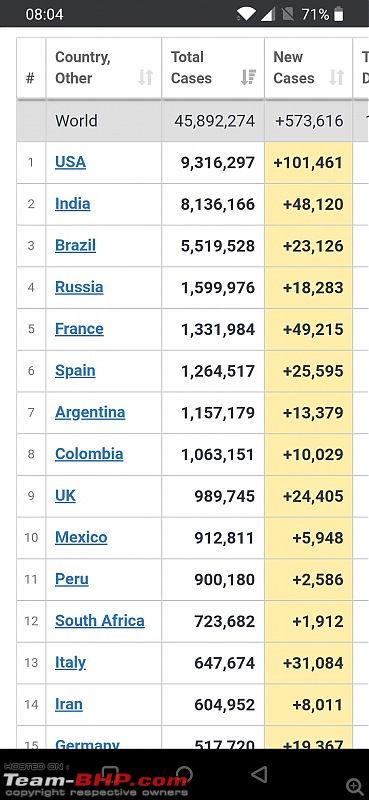Quote:
Originally Posted by Gsynch  While the consensus of the thread is that "Lockdowns are ineffective and local government (Indian govt) have used it because of lack of expertise and vision to fight pandemic", developed countries with much greater resources at their disposal are seen enforcing the second wave of lockdown.
"We are all in the same position: overrun by a second wave which we know will be harder, more deadly than the first, he said. "I have decided that we need to return to the lockdown which stopped the virus."
As a person with a non-medical background, this baffles me. Lockdowns are working or the world over this strategy has been ineffective? |
Most certainly a ton of bulls**t. We might live with Covid but certainly might die on account of such news media and politicians who have found a new way of scare controlling the common people and bulldozing their way by imposing draconian epidemic acts.
Regarding the objective evidence of EFFICACY of lockdowns -
On May 22, the Indian government claimed that the lockdown had averted a significant number of deaths. Onestudy by the Boston Consulting claimed that the lockdown had saved between 1,20,000 – 2,10,000 lives. Subsequently, the Indian Scientists Response to COVID-19 also announced that it had found that the lockdown had averted between 8,000 – 32,000 deaths
by 15 May.
The purpose of this note is to explain why, even within the context of epidemiological models, and their generalizations, such claims are MISLEADING. Refer to these graphs below and their explanation.
L →70 day complete lockdown (D20 to D90) with long term precautions
NL1 →No lockdown but long term precautions from day 1
NL2 →Delayed lockdown and long term precautions from day 45
L Vs NL2 scenario @ day 90, the NL2 scenario has had 11,722 excess deaths. However, it is absurd to conclude from this figure that L has “averted more than 11,000
deaths”. This is because, at the end of 365 days, deaths in the L scenario have caught up. In fact, in the model, there are less than 56 excess deaths after 365 days compared to the lockdown scenario.
L Vs NL1 scenario @ day 90. Here, in the model, there are 2078 excess deaths compared to the L scenario. But after 365 days, the difference in deaths drops below 28.
The difference in deaths between the lockdown scenario and the NL1 and NL2 scenarios
shows that the difference in deaths appears to become
very large at intermediate times, but then drops to a very small number by the end of the
epidemic.
Viable alternatives to a nationwide lockdown, which were advocated by several public
health experts, may have included early testing and tracing, localized lockdowns, and a
promotion of more sustainable physical-distancing measures, together with a strong focus on
the welfare of people affected by restrictions.
Source: Mathematical modelling using SEIR and INDSCI-SIM models done at the International Center for Theoretical Sciences (ICTS) , Tata Institute of Fundamental Research, Bangalore. Published 18 Jun 2020
Quote:
Originally Posted by DigitalOne  There is only one country that didn't follow any lockdowns - Sweden. Every other country followed some form of lockdowns. Countries with strong federal laws like the US had state specific lockdowns implemented.
So did lockdowns work? Lockdowns worked in NZ, but Sweden without lockdowns is also doing very well. There are so many variables that if one gives a Yes or No answer, they are being dishonest. Lockdowns also depend on the timing.
Another key question is do you prevent infections or do you want to prevent deaths? Infections cannot be prevented by lockdowns; a virus gonna virus. Eventually, it will get you.
Deaths can be prevented if you enforce a lockdown early. Understanding of virus and treatment protocols become better. That's what happened since around May. Even usage of Dexamethasone for late stage Covid started somewhere only in June (Doctors may correct me, if I am wrong). This, I believe, brought the death rates down considerably.
We also have to understand that the initial severe lockdown in March was based on what was happening in Italy, Spain, South Korea, Belgium, or New York city.
But with the understanding of the virus and the treatments we have since June and death rates falling, no lockdown is justified. Still some countries and some states in India are continuing with it is unfortunate. |
Agree about Sweden. New Zealand presented a unique case because of its relative geographic isolation, but has reported cases after relaxation of its lockdown. The truth is, you can't just blindly copy what someone else is doing, but find your own solutions based on your unique situations. The truth is that's where India and many others failed. Lockdowns don't avert deaths; they merely postpone them - read my post reply on the efficacy of the great Indian lockdown here -
https://www.team-bhp.com/forum/shift...ml#post4919629 (The Coronavirus Thread)
Or talk to the top Swedish epidemiologists!

 (6)
Thanks
(6)
Thanks
 (9)
Thanks
(9)
Thanks
 (10)
Thanks
(10)
Thanks
 (7)
Thanks
(7)
Thanks
 (5)
Thanks
(5)
Thanks
 (5)
Thanks
(5)
Thanks

 (1)
Thanks
(1)
Thanks
 (5)
Thanks
(5)
Thanks
 (10)
Thanks
(10)
Thanks

 (7)
Thanks
(7)
Thanks
 (10)
Thanks
(10)
Thanks
 (10)
Thanks
(10)
Thanks
 (6)
Thanks
(6)
Thanks
 (2)
Thanks
(2)
Thanks









